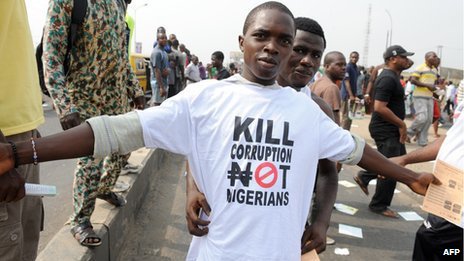By Kole Shettima & Erin Sines
In May 2015, Muhammadu Buhari was sworn in as president of Nigeria, having run on an anti-corruption, economic recovery, and security platform. His victory marked the first peaceful transition of power to an opposition party in Nigeria’s history. In his Covenant with the Nigerian People, Buhari laid out a detailed plan of action, including a war against corruption.
The Foundation launched On Nigeria in September 2016. Our aim was to put our resources to work resolving a problem that Nigerians’ said was important to them – strengthening accountability and fighting corruption. Our approach supports Nigerian-led efforts to reduce corruption by building an atmosphere of accountability, transparency, and good governance.
After reviewing the evidence and consulting experts, we developed a multi-faceted strategy intended to reduce grand and petty corruption in the education and electricity sectors; strengthen the criminal justice system; and support media and journalism to promote accountability.
With our focus on electricity and education, we are dedicating resources to two sectors that Nigerians say are important to them, where they experience significant corruption, and where we feel we can have an impact. We also decided to include petty corruption. Rightly, much of the focus of global and national anti-corruption efforts is on grand corruption; for example, in Nigeria, the administration has had success recovering billons of naira and millions of dollars that were siphoned from public coffers.
However, these important efforts are not always enough to address the entrenched practice of petty corruption – a small “tax” paid to an immigration officer to stamp a passport at the airport or a minor “fee” handed to a police officer to pass through a checkpoint. These small “fees” are what average people in Nigeria contend with on an almost daily basis when trying to access goods and services to which they were entitled as citizens. By prioritizing petty corruption, we and our partners are working to improve people’s daily lives while also bolstering efforts to fight grand corruption.
We have two strong cohorts of education and electricity accountability partners at the early stages of working together to strengthen the system and to ensure that communities receive the services to which they are entitled. While no work happens in a vacuum and externalities influence the context in which all programs exist, these portfolios have particularly felt the effect of the challenges Nigeria is grappling with – the crude oil price crash, the weakened naira, competition pitting the national currency against the dollar, rising inflation and food prices, and dwindling productivity.
From a high of $62 per barrel during the presidential swearing-in in May 2015, the price of oil fell to an all-time low of around $30 in January 2016, before climbing over $50 again in 2017. The foreign exchange reserve declined from $37 billion in 2014 to below $25 billion in 2017. For the first time since the 1980s, the Nigerian economy entered a recession. Long-simmering restiveness in the Niger Delta reignited, stymying oil production.
With a budget heavily dependent on oil revenue, the federal government lacked the funds to enact the new programs it promised during Buhari’s campaign, such as the Social Investment Portfolio, the umbrella under which the Home Grown School Feeding Program operates. States, also dependent on the oil economy, did not have the funds to start new programs, continue existing ones, or even pay workers. The electricity sector fared no better as oil prices dropped, conflict in the Delta flared, a cost-reflective tariff proved difficult to enact, and the growing pains of the 2013 privatization led to finger pointing while customers endured an unreliable power supply.
As a result, many of our sectoral grantee partners were forced to delay the start of their work, move to new states, or change course entirely. Despite our belief that it was important to prioritize efforts to reduce petty corruption and to take a sectoral approach to promoting accountability, we considered whether it would be possible to proceed with these portfolios. Given the massive external challenges facing these sectors, would it still be possible to affect change? Was there appetite for work in these sectors or did people have more pressing concerns?
Recent reports indicate that the economy is out of recession, although it remains fragile. With payments now flowing from the federal government, the Home Grown School Feeding Program has begun in many states. The federal government, private sector, and development partners created the Power Sector Recovery Plan, a major advance toward resolving long-standing power supply issues.
As external pressures ease, more partners are able to begin or continue their important accountability efforts. While these efforts are nascent, we already see signs of progress and are optimistic that our partners will be able to bring importance changes to the sectors and, more important, to people. We are also conscious that old challenges could flare or new challenges arise at any time.
While we continue to monitor the landscape to ensure that there is continued political will to strengthen accountability, we remain deeply optimistic about Nigeria’s future and committed to supporting Nigerian-led efforts to reduce corruption.
Kole A. Shettima is Director, Africa Office and Erin Sines is Director at MacArthur Foundation.
Source: https://www.macfound.org/press/directors-reflection/externalities-and-our-work-nigeria/
